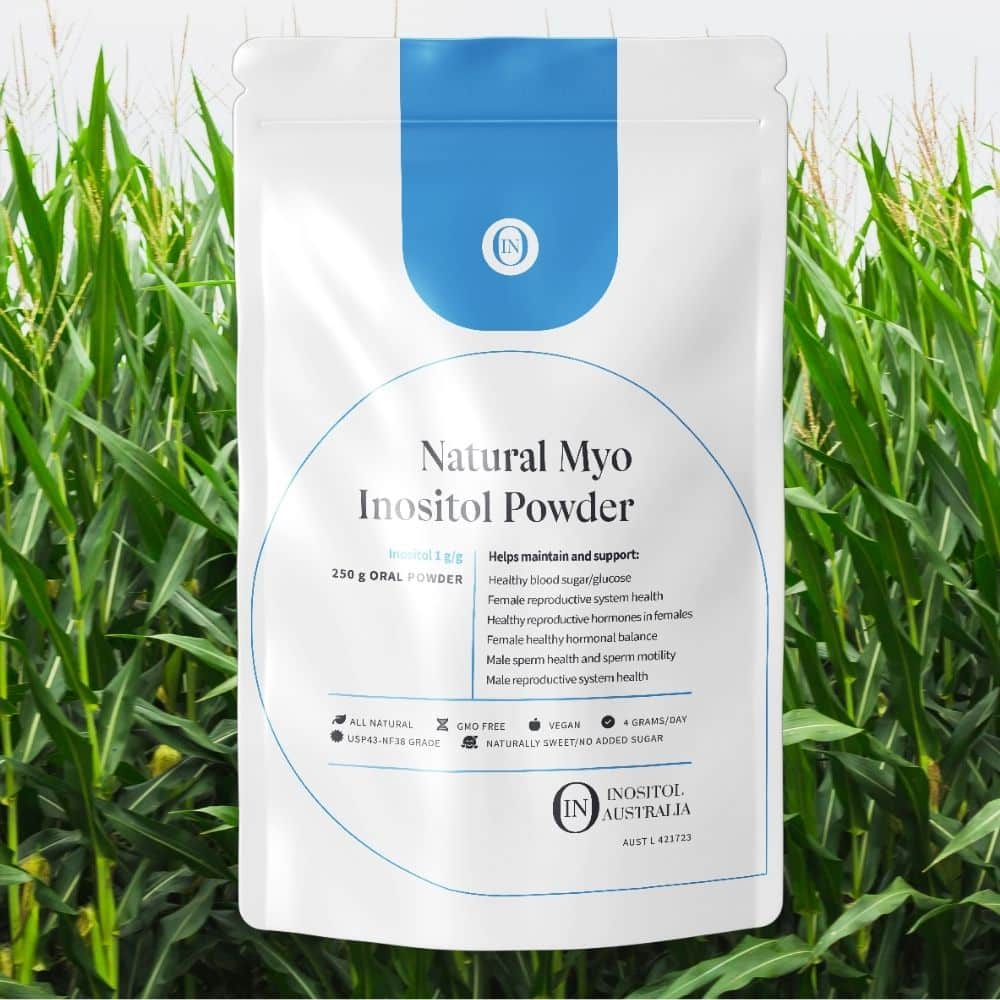
Pregnancy is an exciting time; when a woman’s body changes to support the growth of a new human. Naturally, new and expectant mothers want to do everything that they can to promote the health of their bundle of joy.
During this period, many women consider taking prenatal vitamins and supplements, such as Inositol, to ensure they’re getting the nutrients needed for both themselves and their baby. Sometimes understanding the changing needs of the woman’s body and growing baby can be difficult, though, and you might be asking yourself, is Inositol during pregnancy safe? Should I stop taking Myo-Inositol during pregnancy?
If you are pregnant but you experience issues with mental health, insulin resistance, or you have PCOS, the good news is that it is safe to take Myo-Inositol during pregnancy. That being said, there are some things to consider. Read on to learn more.
What is Myo-Inositol?
Myo-Inositol, also known as vitamin B8, is a vitamin that is naturally found in our diet and produced in our bodies when we eat certain foods.
Taken as a supplement, Inositol is a pseudo vitamin that helps the body perform major functions. It is a significant component of cell membranes, so Inositol supports the body’s overall structural function, has been found to improve insulin action, and affects brain chemicals like serotonin and dopamine.
There are numerous ways that Inositol is split up, and Myo-Inositol is one version of it. D-Chiro-Inositol is another popular supplemental form.
Myo-Inositol when taken alone and, sometimes, when taken in combination with D-Chiro-Inositol, has been shown to be effective in controlling symptoms of PCOS or polycystic ovarian syndrome. PCOS occurs in women of reproductive age and has androgenizing effects.
If you do not have PCOS or known insulin resistance, and you are experiencing signs of infertility, taking a vitamin B8 or Myo-Inositol supplement might help to regulate irregular fertility cycles, normalise insulin sensitivity, and control weight.
Effects of Myo-Inositol on Fertility
Myo-Inositol actually improves the chances of fertility, especially in bodies with PCOS:
- Myo-Inositol vitamin reduces the rate and acceptability of androgens, so the body is reacting to fewer androgens and allowing the normal menstrual and ovarian cycles to carry on in a manner that is more expected in female bodies.
- A woman’s ovarian and menstrual cycles overlap and both occur monthly. If there is a period every month (or approximately 21-35 days), then this means that the body produced an egg, released it, and because it wasn’t fertilised, the inner lining of the uterus was shed. This shedding (bleeding) is to prepare the womb to make another egg and complete the process all over again.
- If the ovarian or menstrual cycles aren’t happening with regularity, it does not indicate that the body is not producing eggs. In fact, women with PCOS often overproduce eggs and don’t end up releasing them. Instead, they are stored in the ovaries and become cysts. These eggs cannot be fertilised.
- Myo-Inositol regulates androgens produced in the body, especially in bodies with PCOS. PCOS might disrupt the ovarian cycle because of excess androgen production. It might increase the number of ova, or eggs, released every month and improve ovarian cycle regulation.
A Closer Look at Myo-Inositol
Myo-Inositol is known to improve ovarian function and fertility. It may also regulate menstrual cycles, pregnancy rates, and ovulation. One study found that Myo-Inositol improved pregnancy by 20% for individuals with PCOS and insulin resistance.
Myo-Inositol improves normal physiological processes like insulin signalling, metabolising fat, and nerve functioning. So in these ways, this vitamin, which is naturally found in many common foods, is a normal part of our daily lives.
Vitamin B8 is not a perinatal supplement, like folic acid, which is a required supplement for pregnant women. Folic acid aids in the fetus’s brain, heart, and spinal cord development. Vitamin B8 supports the physiological function in the body to better prepare for pregnancy and to regulate reproductive processes and should be taken in conjunction with folic acid.
Myo-Inositol and Gestational Diabetes
Gestational diabetes can be scary as it means that the pregnant woman needs to take medication and consider her diet more carefully than normal. Getting pregnant on its own is stressful, and developing gestational diabetes does not help!
Gestational diabetes is when a woman is diagnosed with diabetes for the first time during pregnancy. The cause of gestational diabetes is unknown, but it may be related to an underlying condition, stress, or genetics. Gestational diabetes can be life-threatening to both the expectant mother and the fetus if not treated. Additionally, the diagnosis might go away after birth, typically, two weeks after. Still, it is important to speak with your family physician so that you can develop a plan for treating gestational diabetes or preventing it from occurring.
Myo-Inositol taken before pregnancy, or at the start, can be effective at reducing the risk of developing gestational diabetes. In a recent review of literature, one study found that when the supplement was taken early on in the pregnancy it reduced the risk of developing gestational diabetes by up to 67%!
For women who had developed gestational diabetes, researchers administered an Inositol dose of 4,000 mg, a common therapeutic dose, and the incidence of gestational diabetes was remarkably reduced at a rate of 71% compared to a placebo group.

Can You Take Inositol While Pregnant? The Verdict
So, can you take Myo-Inositol while pregnant?
The short answer is yes. Inositol is generally considered safe not only before but also during pregnancy when taken under medical supervision.
For example, a study published in Diabetes Care treated women from the end of their first trimester. It found that Myo-Inositol supplementation during pregnancy was well-tolerated and showed potential benefits for reducing the incidence of gestational diabetes. For example, the study demonstrated that the Myo-Inositol group had significantly lower GDM incidence (6%) compared to the placebo group.
If you or your loved one has a history of diabetes, insulin resistance, PCOS, or any other conditions closely related to changes in insulin, then taking Myo-Inositol both as a preventative therapy and as a control therapy can reduce the incidence of gestational diabetes.
Myo Inositol Pregnancy Safety Benefits
Taking Myo-Inositol has improved symptoms related to cognitive health, reduced signs of PCOS, and controlled conditions related to insulin resistance like metabolic syndrome and preventing the onset of type-2 diabetes. And understandably, you will want to continue to manage these symptoms during pregnancy.
If you, or someone you know, are taking Myo-Inositol for any of these reasons, then it is crucial that you speak with your doctor to discuss your treatment options. Myo-Inositol has been shown to be safe for therapeutic uses even in pregnant women; however, someone with overlapping conditions should seek the advice of a medical professional during the pregnancy and stay consistent with other medications and therapies.
Some individuals take Myo-Inositol as a preventative modality. A person with PCOS who does not require Myo-Inositol to control symptoms might want to add Myo-Inositol as a supplement when pregnant. Individuals with PCOS have a higher chance of developing gestational diabetes, which is diabetes that is diagnosed or develops for the first time during pregnancy.
For optimal health, Myo-Inositol can also be taken to improve the cellular development of the fetus. In this instance, there is no medical necessity and Myo-Inositol can be taken to improve the fetus’ growth and development.

How Much Inositol During Pregnancy?
The optimal dosage of inositol during pregnancy can vary depending on individual needs and medical conditions. However, most studies have used doses ranging from 2 to 4 grams of myo-inositol per day. A randomised controlled trial published in Diabetes Metab Res Rev used a dosage of 4 grams of Myo-Inositol plus 400 mcg of folic acid daily, starting from the first trimester.
Take the Next Step in Your Pregnancy Journey with Inositol
If you are looking to support your health during pregnancy naturally, consider adding Inositol Australia’s premium Myo-Inositol powder to your daily routine. Our high-quality, pharmaceutical-grade supplement is designed to give women the support they need, no matter where they are in life. With our natural formulation, our Myo-Inositol powder offers a safe and effective way to nurture your body and your growing baby.
Visit our website now to learn more about our Myo-Inositol powder and take advantage of our 60-day money-back guarantee. Remember, always consult with your healthcare provider before starting any new supplement during pregnancy.
Nurture your pregnancy health today with Inositol Australia.
References:
Genazzani, A. D., Lanzoni, C., Ricchieri, F., & Jasonni, V. M. (2008). Myo-inositol administration positively affects hyperinsulinemia and hormonal parameters in overweight patients with polycystic ovary syndrome. Gynecological Endocrinology, 24(3), 139-144. Retrieved Dec 11, 2020.
Gerli, S., Mignosa, M., & Di Renzo, G. C. (2003).Effects of inositol on ovarian function and metabolic factors in women with PCOS: a randomized double blind placebo-controlled trial. European review for medical and pharmacological sciences, 7, 151-160. Retrieved Dec 11, 2020.
Inositol Australia. (2020). How To Treat Insulin Resistance Naturally. Retrieved Dec 11, 2020.
Inositol Australia. (2020). What Foods Are High In Inositol. Retrieved Dec 11, 2020.
Lisi, F., Carfagna, P., Oliva, M. M., Rago, R., Lisi, R., Poverini, R., … & Marci, R. (2012). Pretreatment with myo-inositol in non polycystic ovary syndrome patients undergoing multiple follicular stimulation for IVF: a pilot study Reproductive Biology and Endocrinology, 10(1), 1-7.
Mayo Clinic Staff. (2020). Menstrual cycle: What’s normal, what’s not. Mayo Clinic. Retrieved Dec 11, 2020.
Morgante, G., Orvieto, R., Di Sabatino, A., Musacchio, M. C., & De Leo, V. (2011). The role of inositol supplementation in patients with polycystic ovary syndrome, with insulin resistance, undergoing the low-dose gonadotropin ovulation induction regimen. Fertility and sterility, 95(8), 2642-2644. Retrieved Dec 11, 2020.
Raffone, E., Rizzo, P., & Benedetto, V. (2010). Insulin sensitiser agents alone and in co-treatment with r-FSH for ovulation induction in PCOS women. Gynecological Endocrinology, 26(4), 275-280. Retrieved Dec 11, 2020.
Tahir, F., & Majid, Z. (2019). Inositol Supplementation in the Prevention of Gestational Diabetes Mellitus. Cureus, 11(9). Retrieved Dec 11, 2020.



